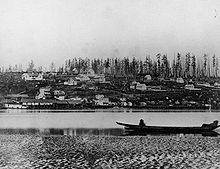
Qayqayt First Nation
Encyclopedia

British Columbia
British Columbia is the westernmost of Canada's provinces and is known for its natural beauty, as reflected in its Latin motto, Splendor sine occasu . Its name was chosen by Queen Victoria in 1858...
. The Qayqayt First Nation historically spoke the Hun'qumi'num (Downriver) dialect
Halkomelem language
Halkomelem is a language of the First Nations peoples of southeastern Vancouver Island from the west shore of Saanich Inlet northward beyond Nanoose Bay, and of the mainland around the Fraser River Delta upriver to Harrison Lake and the lower...
of Halkomelem, a Coast Salish language. The Qayqayt reserve used to exist on the banks of the Fraser River
Fraser River
The Fraser River is the longest river within British Columbia, Canada, rising at Fraser Pass near Mount Robson in the Rocky Mountains and flowing for , into the Strait of Georgia at the city of Vancouver. It is the tenth longest river in Canada...
, around New Westminster. The Qayqayt First Nation is one of the smallest First Nations in Canada and the only one registered without a land base.
History
In 1879, the federal government allocated three reserves to what was then known as the New Westminster Indian Band, including 104 acre (0.42087344 km²) of the South Westminster Reserve, 22 acres (89,030.9 m²) on the north arm of the Fraser RiverFraser River
The Fraser River is the longest river within British Columbia, Canada, rising at Fraser Pass near Mount Robson in the Rocky Mountains and flowing for , into the Strait of Georgia at the city of Vancouver. It is the tenth longest river in Canada...
and 27 acres (109,265.2 m²) on Poplar Island
Poplar Island (British Columbia)
Poplar Island is an uninhabited island located at the east end of the North Arm of the Fraser River in the City of New Westminster, British Columbia. It is the last large undiked island in the Fraser River's North Arm.-History:...
. A smallpox epidemic devastated the people of Qayqayt (which was the name of the village on the east bank of the Fraser) reducing the population of the band from about 400 people to under 100. Many of the remaining Qayqayt were assimilated into other local reserves, such as the neighbouring Musqueam Indian Band
Musqueam Indian Band
The Musqueam Indian Band is a First Nations government in the Canadian province of British Columbia, and is the only Indian band whose reserve community lies within the boundaries of the City of Vancouver....
. Their reserve on Poplar Island was turned into an Aboriginal smallpox victim quarantine area. For decades, the Poplar Island reserve was designated as belonging to "all coast tribes".
Members of the band drifted away until one first nation couple, the Bandura couple, were left on the former reserve land. They died leaving their daughter, Marie Lee, an orphan at a Kamloops residential school. In 1913 the federal government seized most of the New Westminster Band's reserve lands. In 1916 the remaining land on Poplar Island was turned over to the BC Government. The orphaned Marie Lee Bandura moved to Chinatown and lived with her sister Dorothy. Eventually she married, but raised her four children as Chinese. One day she told her daughter Rhonda Larrabee about her true heritage: "I will tell you once, but you must never ask me again." After her mother's death, in 1985, Larrabee started to research her heritage. She now works to restore her Band's land, culture and pride. In 1994 she became the first new federally recognized member of Qayqayt First Nation in over 30 years. Since 1994 she has been able to track down 8 other members of the Qayqayt First Nation. In 1996, the tribe received fishing rights on the Fraser River.

